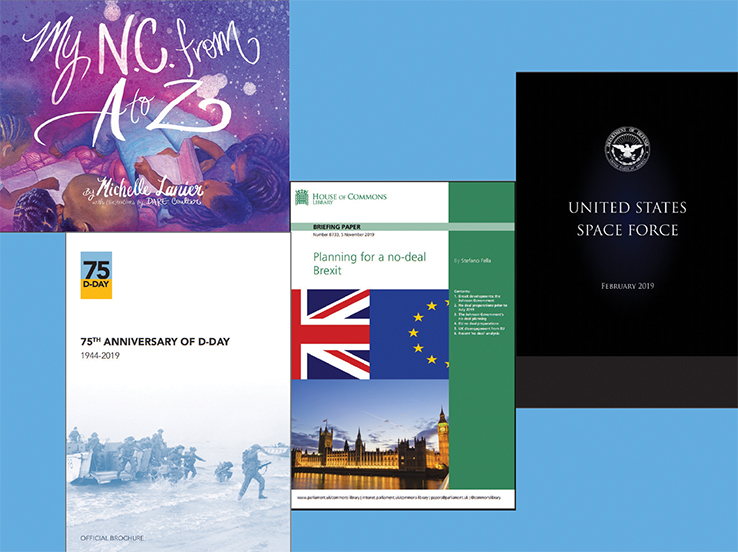Updating Congress | Notable Government Documents 2019
The Government Publishing Office (GPO) recently advanced an initiative to modernize the formatting of house committee reports and other documents to make them not only more readable on paper, but more accessible in online formats and through a variety of electronic devices. Now government documents will be available on the Digital Public Library of America's (DPLA) Open Bookshelf platform. This year's selected notable government documents cover topics ranging from artificial intelligence to Alaska's gold stampede, and from family separation at the border to healthy bees to Brexit.

For 150 years, congressional documents such as house committee reports have been printed with small, dense typefaces designed to economize on paper consumption at the cost of readability. The Government Publishing Office (GPO) recently advanced an initiative to modernize the formatting of these and other documents to make them not only more readable on paper but more accessible in online formats and through a variety of electronic devices.
This initiative is led by Hugh Halpern, the GPO’s new director. Halpern was nominated in October 2019, after the nomination of Robert Tapella failed to advance through the Senate Committee on Rules and Administration. Halpern was confirmed by the Senate on December 4, 2019 and sworn in on December 11, 2019. Prior to joining the GPO, Halpern held various roles in government in the last 30 years, including Director of Floor Operations for the Speaker of the U.S. House of Representatives under Paul Ryan. Halpern’s appointment ends the two-year vacancy in the GPO director’s office since Davita Vance-Cooks left in October 2017.
As Director of Floor Operations, Halpern acquired an extensive knowledge of official congressional documents and frequent collaborated with the GPO to facilitate document production. In his testimony before the Committee on House Administration on March 3, Halpern noted that committees often produce documents in unofficial media like web pages and white papers because the formatting requirements for more formal alternatives are time intensive and occasionally non-intuitive. Halpern illustrated this with three house committee reports from 1861, 1936, and 2019 that were all identical in design layout. Halpern noted further that informal dissemination of government documents obscures access to these resources by the public and confounds the understanding of legislative processes and priorities. By adopting more flexible design and composition, committees and other government agencies can shift their efforts toward content production and away from laborious formatting requirements.
This reinvention of document production is made possible by Xpub—a software platform that facilitates simultaneous production of documents in a variety of formats for access on mobile apps and websites, and in ebooks, pdfs, and print. The first document produced via this new system is the 2018 U.S. Code. It was completed in less than one year, and would have taken a year and a half using the 30-year-old MicroComp system that Xpub replaces.
The GPO recently partnered with the Digital Public Library of America (DPLA) to make government documents available through ebook platforms. DPLA provides access to both commercial and open resources through partnerships with hosting organizations. The National Archives and the Smithsonian, for instance, provide access to several million items in their collections through DPLA and now government documents will be available on the DPLA’s Open Bookshelf platform. This partnership will fill a void in the GPO’s service model by supplying a platform for e-readers and make government produced books more accessible. This year's selected notable government documents cover topics ranging from artificial intelligence to Alaska's gold stampede, and from family separation at the border to healthy bees to Brexit.
THE ALA/GODORT PANEL
Chair Bryan Fuller, Morgan State Univ.
Federal Selector Rick Mikulski, Portland State Univ., OR
Federal Judge Suzanne Reinman, Oklahoma State Univ.,
Federal Judge Christine Adams, Youngstown State Univ.
State/Local Selector Esther Fautyi, Morgan State Univ.
State/Local Judge Angela Kent, Texas State Library
State/Local Judge Bryan Fuller, Morgan State Univ.
International Selector Sonnet Ireland, St. Tammany Parish Lib.
International Judge Angela Kent, Texas State Library
International Judge Laura Sare, Texas A&M University
|
See this year's full selection of notable Federal, state and local, and international documents |
Add Comment :-
RELATED
ALREADY A SUBSCRIBER? LOG IN
We are currently offering this content for free. Sign up now to activate your personal profile, where you can save articles for future viewing








